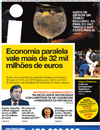Portugal’s black economy rose from 9.3% of GDP in 1970 to 24.8% by 2010, writes Lisbon dailyi. According to a study by the University of Porto, GDP stood at €130 billion, while parallel economy was €32 billion. The figures are worrisome, the daily continues — the OECD average is 17% and only Greece and Italy have higher percentages.
The black economy thrives on undeclared second jobs, menial work or rent paid without receipt, explains the Lisbon daily. The tertiary sector (including building, rentals, services, restaurants) is the most affected, with VAT climbing from 17% to 23% in the last decade, and the current crisis might make matters worse. “Taking into account rising taxes and unemployment, it should grow again,” warns economist Óscar Afonso, author of the study.
Payments in cash are a huge source of revenue for the underground economy and “government [austerity] measures provide the incentive,” argues another economist, Sérgio Vasques, while a consulting firm quoted by the daily urges encouraging more online and credit card payments to reduce it.
The Porto study argues that the black economy explains “the survival of populations in countries where GDP per capita is under the subsistence threshold.” According to a study by the University of Bogazici in Turkey, the black economy can have a positive effect on impoverished places, but makes statistics unreliable. “Saying it revitalises the economy is like saying crime creates jobs”, concludes Vasques. “Living underground is no project for a country.”
Do you like our work?
Help multilingual European journalism to thrive, without ads or paywalls. Your one-off or regular support will keep our newsroom independent. Thank you!
















